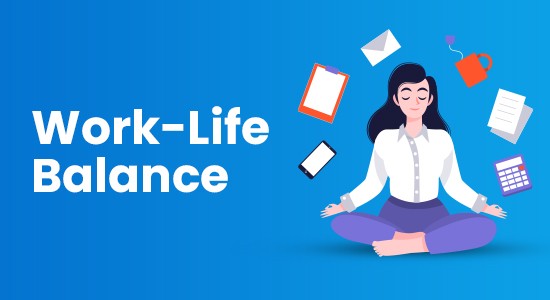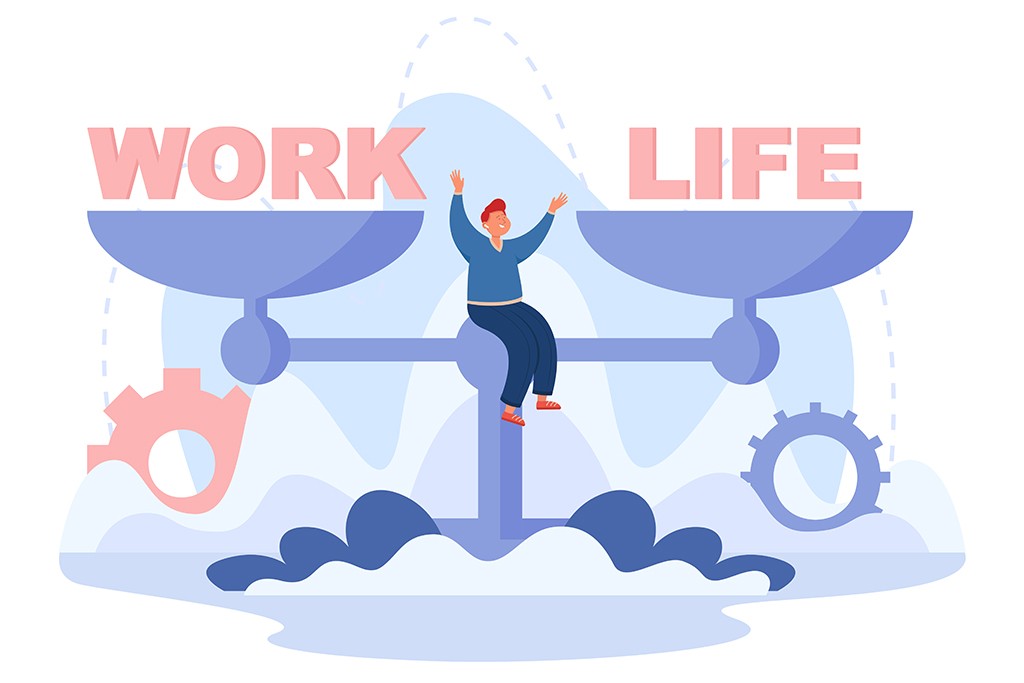Work-Life Balance
Work-Life Balance
Work is an important element of everyone’s lives. The earnings we make guarantee that the lights are kept on, food is on the table, and the rainy-day fund is full. With the growing cost of living issue and energy bills on everyone’s mind, no one can deny the significance of earning enough to live… it simply makes attaining work-life balance that much more difficult!
We are becoming more linked as a result of technology and social media. Working from home has become the new normal for many people. It’s getting increasingly difficult to keep business and personal life apart. It’s standard practice to check emails at all hours of the day and night, to conduct business calls at the dinner table, and to work on our computers on weekends. How has this become acceptable?

A good work-life balance
To every one of us, a good work-life balance will mean something different. It’s not so much about dividing your time evenly between work and play as it is about feeling fulfilled and content in both aspects of your life. A good balance may be:
- meeting your deadlines at work while still having time for friends and hobbies
- having enough time to sleep properly and eat well
- not worrying about work when you’re at home.
This can be challenging if, for example, we also have caring responsibilities, a demanding boss, or health difficulties.
How do I know if my work-life balance is unhealthy?
Working long hours or being under high stress might become normalized, especially if we’ve been doing it for a long time or if many of our coworkers are in the same situation. Our beliefs and behaviors about work may become deeply ingrained unless we take a step back every now and then.
Change isn’t always achievable at work: if you’re on a zero-hours contract, for example, you might not feel safe speaking out, or you might need to work long hours to earn enough money to pay your expenses. Work-life balance is a cycle, not an achievement, suggests regularly checking your work-life balance by following five steps.
- Pause. Ask yourself – what’s currently causing me stress or unhappiness? What impact does this have on my career and personal life? What am I putting first? What am I passing up? We seldom take the time to think about our jobs until a big life event occurs, such as the birth of a child or the death of someone important to us. However, simply sitting and reflecting on your priorities might help you determine whether the way you live and work is good for you.
- Pay attention to your feelings. Now you’re more aware of your current situation, how does it make you feel? Are you content and cheerful, or are you furious and resentful? Being conscious of your emotions might help you select which adjustments to make.
- Reprioritise. Think about what needs to change. For example, you might want to ask yourself if working long hours is worth losing out on family time or whether working weekends is worth losing out on your social life.
- Consider your alternatives. Is there anything at work you can change to meet your new priorities?
- Make changes. For example, you may request flexible hours, use all of your yearly leave, or refrain from checking emails on weekends.
Helping yourself
There are steps you can take to improve your work-life balance.
It can be difficult or impossible to stand up for yourself at work if you’re precariously employed or worried about losing your job. Make sure you know your rights and see if any of our tips feel safe for you to try:
- Try to ‘work smart, not long’. This involves prioritizing – allowing a certain amount of time per task – and trying not to get caught up in less productive activities such as unstructured meetings.
- Speak up when job expectations and demands are excessive. Your boss and employer must be aware of the pressures in order to handle them.
- Take proper breaks at work. For example, take at least half an hour for lunch and leave the workplace if you can for a 5-10 minute walk.
- Try to draw a line between work and home. If you work from home, try to keep to a routine, make a dedicated workspace, and switch off when the working day is over.
- If work makes you feel you don’t have quality time for your partner or friends, try to include scheduling time together, getting help with chores and childcare, and making every second count if you don’t have much spare time.
- Track your working hours over weeks or months as opposed to days. This will provide you with a more accurate view of your work-life balance. Consider the number of hours spent fretting or thinking about work; they are a solid measure of job-related stress.
- If at all feasible, discuss your work-life balance with your coworkers and management. The more apparent the process, the more likely it is to produce results.

How your workplace can help
Finding the right balance should not be left up to you. Your boss and workplace both have an impact. They must:
- Encourage an open atmosphere so that you can speak out if you are under too much strain.
- Teach managers how to recognize stress and poor work-life balance
- Provide flexible and remote working whenever feasible and promote breaks, whether during the working day or via the use of annual leave
- Review your workload on a regular basis to ensure that it is manageable; allow you time off to volunteer; and boost assistance for parents and carers so that they are not pushed to quit.
- Allow you to visit your counselor and support services during working hours in the same way as they would for other medical appointments
- Stress-relieving activities should be encouraged, such as lunchtime exercise or relaxation sessions.


